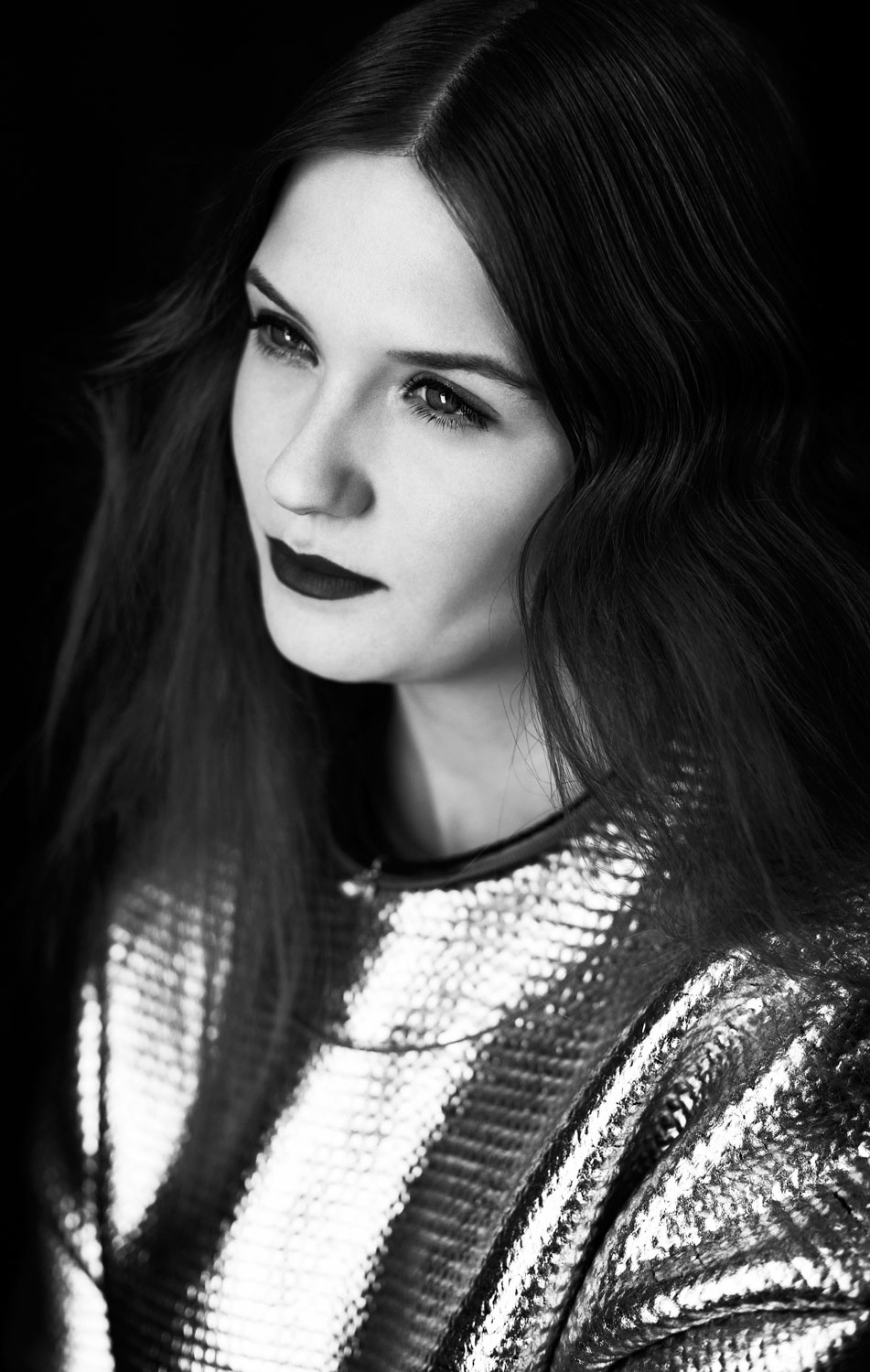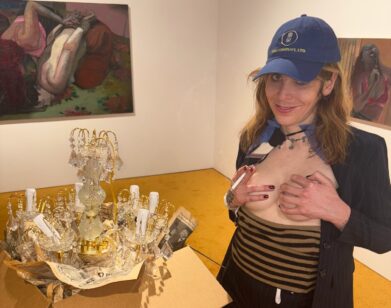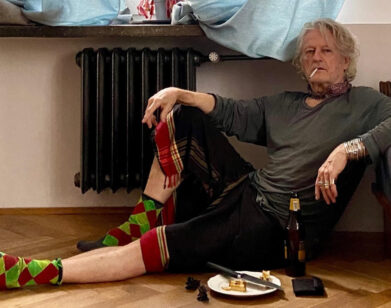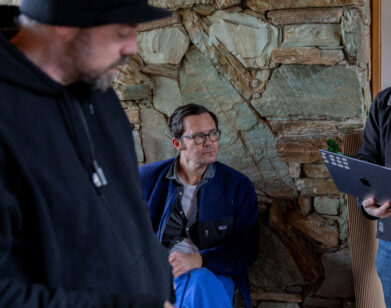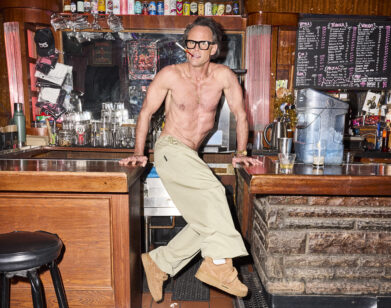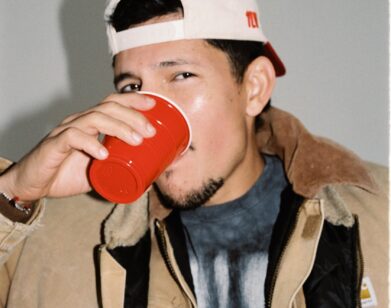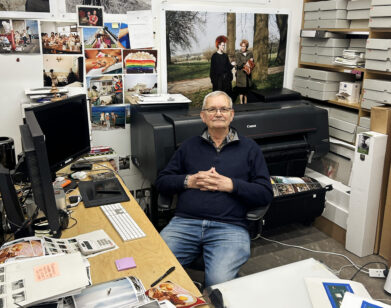Bonnie Wright
Of all the characters in the Harry Potter series, Ginny Weasley’s transformation over the course of seven books might be the most dramatic—at first a shy little girl with a crush on her big brother’s best friend, she ends up a self-possessed wizard fully capable of holding her own against some of the most powerful dark forces in her world (and of hanging onto Harry Potter’s heart, to boot). And of all the actors chosen to portray Harry Potter‘s young characters in the blockbuster series of film adaptations, Bonnie Wright’s transformation over the course of the last decade rivals only Emma Watson’s as the most surprising: now 21, she’s a stunning, eloquent young woman whose career is sure to last long beyond the Potter franchise.
The last Potter film, Harry Potter and the Deathly Hallows: Part 2, comes out July 15; we caught Wright in a time of transition, between finishing shooting it and heading to Jakarta to shoot her next feature, The Philosophers. She took some time out to talk to us about Ginny, her family, her costars, and her future.
ALEXANDRIA SYMONDS: You’ve been playing Ginny for 10 years now, right?
BONNIE WRIGHT: Yeah, that’s right—it’s been a whole decade.
SYMONDS: What’s that like, to do one character for your entire adolescence? What sort of effect do you think it’s had on you?
WRIGHT: I think it has a big effect. We started when we were very young, especially me. I didn’t know anything about the film industry, so it definitely has taught me a great deal, in terms of something I wouldn’t have learned about. It’s completely inspired me to become a part of, you know, for my career—not just something I did when I was younger. I think when you’re younger, you need to socialize and be with people your own age. Whereas when we started, we were working with people with a complete mix of ages. The generation gap made us all mature much quicker, and become very used to talking to older people and being a bit more socially aware.
SYMONDS: How does it feel now that it’s all over, and there’s nothing left to film?
WRIGHT: It’s very weird. I think it’s one of those things that we thought would never, ever happen. It was the last week, and then it finally became the last day, and it was just so bizarre. I think for all of us, it’s been such a long journey, and such an amazing journey, that we were all very happy to tie it up and move on to the next stage of our lives. I think that’s the most important thing now for me, is definitely to keep acting, and to try and diversify my skills and share myself in different roles. When you start so young working, you build a hunger for acting, working, and a busy life.
SYMONDS: What was it like the last day on set? How do you deal with the end of all of that—is there a lot of crying?
WRIGHT: It was much more emotional than anyone anticipated. I think what was bizarre about it was we were so used to that environment of the studios, sets, and people you are with, that it became almost like a second home to us. For that to suddenly finish was the weirdest thing for us. This thing that had become such a norm for us was suddenly going to be just terminated. I think it takes a long time, I think it did for everyone. The next six months afterwards, and even now, because the last film hasn’t come out—that feeling of it settling in, slowly but surely, that it’s finally going to be the end when the last film comes out. It was a big thing for us all, but I think it was a very proud moment for everyone, as well. It was a time to celebrate the amount of work people had put into it, and how much of a success it has been.
SYMONDS: Do you think playing Ginny for so long made you more like her?
WRIGHT: I don’t know, I think it’s a mixture. Sometimes you need to put your own characteristics into the actor, and you take different things from the character that you admire—sometimes you can’t see the boundaries anymore. I don’t know. I’ve always loved her—she is very fearless as a character, doesn’t really care what other people think, and she speaks her mind. I think that fearlessness is something that people do admire in her.
SYMONDS: Is your family like hers? Did you come from a similarly huge family?
WRIGHT: I only had a mum, dad, and brother. I didn’t have the massive seven-brother family. But I think I came from a family much like them; not massively materialistic, just a comfortable, warm home. We’ve always had a lot of humor in our family, so I can defiantly relate to what their dynamic was as a family.
SYMONDS: In the new movie, one of the sort of fan-favorite moments from the book involves your character and Mrs. Weasley—when Mrs. Weasley curses at Bellatrix Lestrange. When you were doing that moment on set, what was that like?
WRIGHT: It was in the Great Hall, and it’s an amazing moment for Mrs. Weasley—Julie Walters is the actor. She finally gets to show us what she’s made of, and obviously Mrs. Weasley is protecting Ginny and protecting her family. It’s just a great moment to show what family is, and the alliance that they have, and how strong a unit they are.
SYMONDS: You mentioned before that being thrust into this situation so young made you and the other younger cast members mature quickly and learn how to speak to older people. Did you get any memorable acting advice from the film legends that you were working with?
WRIGHT: Yeah, definitely. We were surrounded by a mixture of so much amazing talent and such long careers. Their knowledge and charisma was difficult to escape, you know! [laughs] On set, you could definitely feel that you were in the presence of someone who has acted in amazing films and has performed incredibly. They were all very open to us, and talked to us, but it wasn’t until the films went on, when we grew older, that they really began to relate to us and talk to us more. When we were younger, everything was a bit more divided, because we had school to get on with and different things. I think as we got older and we had many more scenes with them, that relationship did build much more in terms of the idea of talking about what was happening in the scene and sharing ideas. We did a bit more collaborating together.
SYMONDS: Have you kept up with your co-stars since you’ve finished filming, or have you all gone off and started doing your own things?
WRIGHT: We have definitely been able to still see each other. We did press in New York in April, all of us went to see Dan [Radcliffe]’s play and saw him afterwards, and that was amazing. I’ve definitely seen more than I’ve imagined of people, luckily enough, people haven’t been all over the place too much. But I think what’s amazing now is just seeing the pathways people take. Going to see new films they’re in, or going to see plays they’re doing, or different things—that’s this whole network that we’re lucky to all have gained that from the film.
SYMONDS: I know you have a couple of film projects coming up—are you set on continuing to act? Have you thought about college, or doing something else? Or is this definitely what you want to do?
WRIGHT: Yeah, I’ve got a new movie coming that I’m off to shoot in a week and a half, but I’m also just finishing my second year of college at the moment. In America you have four years, but we just have three years, so I’ll be graduating next year.
SYMONDS: What’s your concentration?
WRIGHT: I’m studying film and television in London. So that’s very interesting. I kind of went towards that: the idea of writing, storytelling, all the different things that go behind film; and I always wanted to go to art school, and it’s one of the big art schools of London, so that was a dream that I completed.
SYMONDS: Did you end up writing any screenplays?
WRIGHT: I’m actually in the process of writing a short screenplay for a film that I’m going to be directing in our final year. That will be very exciting.
SYMONDS: That’s fantastic! Can you tell me what it’s about?
WRIGHT: It’s quite new, but it’s basically about a relationship between a mother and daughter, and it’s set in an area in England, in East Sussex, called Romney Marsh, which is a very interesting environment that I always went to as a child and grew up with, so it’s very much about the location. It’s a very bleak, quite bizarre area. So it’s a film, basically, about that area of England.
SYMONDS: As a director, who are some of your inspirations?
WRIGHT: I’ve always loved the dialogue that Pedro Almodóvar writes. And I’ve always loved Jane Campion, I like the sort of mood that she created in The Piano and Bright Star. I think it’s important, not only to be inspired by specific directors, but by specific films. I think with our coursework, it’s really interesting watching other people and the originality that people can bring.
SYMONDS: Can you tell me about your role in Geography of the Hapless Heart?
WRIGHT: Yeah, that’s a short film I did about two years ago. It’s going to be one of five, they’re set in different cities, at all different times. And they’re linked through a necklace that’s passed through the stories. Mine was the first story, it was set in London. It’s about this young man who’s walking home from work along the South Bank in London, and he reflects over his relationship he had with this girl that he basically ruined, and the girl is the character I play.
SYMONDS: And the movie that you’re going off to shoot next week, is that The Philosophers?
WRIGHT: Yeah, that’s The Philosophers. I’m off to Jakarta in one and a half weeks.
SYMONDS: Have you ever been there?
WRIGHT: No, I haven’t. I’ve been to a lot of areas of Thailand and Australia, but I’ve never been to Indonesia, and I’m very interested in the area and the locations that we’re shooting in. It’s going to be amazing. We’re shooting in the grounds of Buddhist temples and the grounds of massive volcanoes. All the photos I got sent yesterday by the director, and I’m just so excited to go and see these incredible landscapes.
SYMONDS: Can you explain your role a little?
WRIGHT: It’s set in an international school in Jakarta. It’s called The Philosophers because it’s based around this philosophy classroom, before they graduate from their last year of high school from this international school. Their philosophy teacher is very sort of strange and corrupt. There’s a thing in philosophy called “thought experiments,” where you basically imagine a situation that you go in as a group and put philosophical ideas into practice. We use our imagination, that we all create and think of, as this bunker that’s going to sleep ten people to hide out from a nuclear war, a [post]nuclear sort of world. And it’s all this battle between the 21 of us, the students and the teacher, of who should be saved, who should go in this bunker. It’s quite a psychological thriller; we flick back from this imaginary world and into the classroom. It’s very sort of analytical, about ideas and friends against friends, so it should be interesting.
SYMONDS: Did you take philosophy classes when you were in school, or is this film sort of your education in philosophy? This film?
WRIGHT: I never really studied it as a subject. A lot of my English writing and my dissertation, my final essay, was referencing lots of philosophers. I have always been interested in that idea. I think it’s such a broad world that lots of people kind of are shy about, I think, philosophy. People just don’t want to, maybe, study the human psyche, and how challenging it can be.
SYMONDS: Do you have any favorites?
WRIGHT: Well, at the moment, I’m looking, for my dissertation, at Sigmund Freud and Walter Benjamin, who wrote specifically about film as well.
SYMONDS: Has that made you re-examine your dreams at all?
WRIGHT: Um, I think so. I think sometimes when you begin to examine things—like yourself—suddenly you can just freak out and not want to go any further. So I think this film in a sense, we’re all going to be the 20 of us together, throwing ideas about together—it will be interesting to see how far we push it, and what comes from it.
SYMONDS: It can be hard not to go a little crazy when you read too deeply into Freud.
WRIGHT: Yeah!
HARRY POTTER AND THE DEATHLY HALLOWS: PART 2 IS OUT JULY 15.
Slideshow photo credits
Photographer: Alex Sainsbury
Stylist: John Colver
Hair: Alex Brownsell @ Punishment
Makeup: Ken Nakano
Photographer’s assistant: Hugo Yangula
Set design: Georgina Pragnall
Shot at Lee Street Studios, London
Bonnie Wright
Of all the characters in the Harry Potter series, Ginny Weasley’s transformation over the course of seven books is the most dramatic—at first a shy little girl with a crush on her big brother’s best friend, she ends up a self-possessed wizard fully capable of holding her own against some of the most powerful dark forces in her world (and of hanging onto Harry Potter’s heart, to boot). And of all the actors chosen to portray Harry Potter‘s young characters in the blockbuster series of film adaptations, Bonnie Wright’s transformation over the course of the last decade rivals only Emma Watson’s. Now 21, she’s a stunning, eloquent young woman whose career is sure to last long beyond the Potter franchise.
The last Potter film, Harry Potter and the Deathly Hallows: Part 2, comes out July 15; we caught Wright in a time of transition, between finishing shooting it and heading to Jakarta to shoot her next feature, The Philosophers. She took some time out to talk to us about Ginny, her family, her costars, and her future.
ALEXANDRIA SYMONDS: You’ve been playing the character of Ginny for 10 years, right?
BONNIE WRIGHT: Yeah, that’s right—it’s been a whole decade.
SYMONDS: What’s that like, to do one character for your entire adolescence? What sort of effect do you think that’s had on you?
WRIGHT: I think it has a big effect. We started when we were very young, especially me. I didn’t know anything about the film industry, so it definitely has taught me a great deal, in terms of something I wouldn’t have learned about. It’s completely inspired me to become a part of, you know, for my career—not just something I did when I was younger. I think when you’re younger, you need to socialize and be with people your own age. Whereas when we started, we were working with people with a complete mix of ages. The generation gap made us all mature much quicker, and become very used to talking to older people and being a bit more socially aware.
SYMONDS: How does it feel now that it’s all over, and there’s nothing left to film?
WRIGHT: It’s very weird. I think it’s one of those feelings that we thought would never, ever happen. It was the last week, and then it finally became the last day, and it was just so bizarre. I think for all of us, it’s been such a long journey, and such an amazing journey, that we were all very happy to tie it up and move on to the next stage of our lives. I think that’s the most important thing now for me, is definitely to keep acting, and to try and diversify my skills and share myself in different roles. When you start so young working, you build a hunger for acting, working, and a busy life.
READ THE FULL INTERVIEW.
Photo credits
Photographer: Alex Sainsbury
Stylist: John Colver
Hair: Alex Brownsell @ Punishment
Makeup: Ken Nakano
Photographer’s assistant: Hugo Yangula
Set design: Georgina Pragnall
Shot at Lee Street Studios, London

